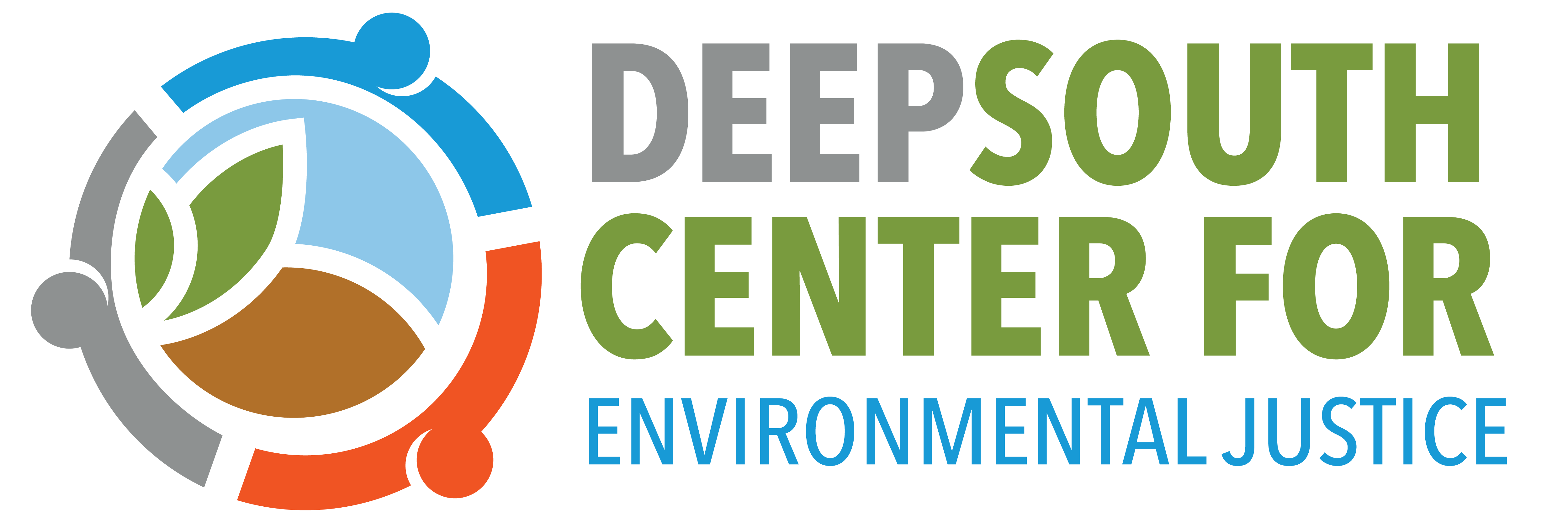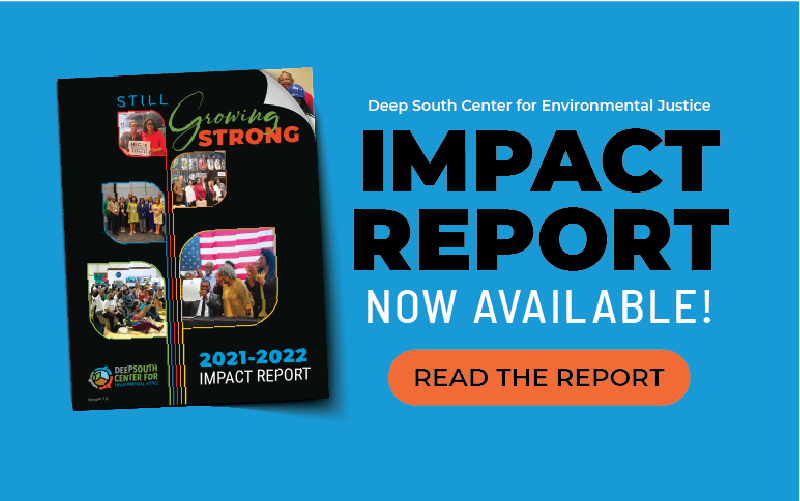
Mar 23, 2023 | DSCEJ General News, The Latest News
Report Illustrates The Center’s Community-Centered Efforts Throughout 2021 and 2022
FOR IMMEDIATE RELEASE: March 22, 2023
Contact:
Ginger LeBlanc | gingerl@dscej.org
Valerie Keys | vkeys@skdknick.com
New Orleans, LA — Today, the Deep South Center for Environmental Justice (DSCEJ) released its two-year impact report highlighting the organization’s community-centered work through 2021 and 2022. DSCEJ’s efforts to empower communities historically impacted by environmental racism, promote community-led solutions to the climate crisis and put environmental justice at the center of all climate action were bolstered by philanthropic funding and high-profile engagements with federal, state, and local lawmakers.
The DSCEJ’s 2021-2022 Impact Report can be found here.
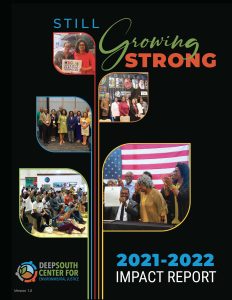
In 2021, Dr. Beverly Wright, Executive Director and Founder of The Deep South Center for Environmental Justice was appointed to the Biden Administration’s White House Environmental Justice Advisory Council and charged with providing recommendations on how to address current and historic environmental injustice to the White House Environmental Justice Interagency Council (IAC) and the Chair of the White House Council on Environmental Quality (CEQ). This appointment provided Dr. Wright and DSCEJ with a platform to ensure the priorities of environmental justice communities are being addressed in Washington.
The administration’s commitment to environmental justice kicked off with the announcement of Justice40, a whole-of-government approach to embedding environmental justice in the operations of the federal government by requiring that historically disadvantaged communities receive 40 percent of federal investments in clean energy solutions. The administration followed with various engagements with DSCEJ, including EPA Administrator Michael Regan’s Journey to Justice tour. Backed by community advocates, DSCEJ helped to organize a “toxic tour” throughout Cancer Alley, an 85-mile corridor along the Mississippi River lined with over 150 petrochemical plants and 7 oil refineries. Administrator Regan received an immersive tour that brought him face to face with the devastating effects of living with high polluting industries in your backyard.
Following Administrator Regan’s visit, the EPA has issued enforcement actions to help address air pollution, unsafe drinking water, and additional issues. As part of his commitment, in September 2022, the EPA announced the creation of the Office of Environmental Justice and External Civil Rights, to help better advance environmental justice by enforcing civil rights laws in overburdened communities and providing new grants and technical assistance.
Earlier this year the EPA announced a tighter national ambient air quality standard (NAAQS) for a fine particle pollution also known as PM2.5.Black communities are exposed to PM2.5 air 1.54 times higher than the rest of the population. In February 2023, the EPA and Department of Justice took a monumental step and filed a lawsuit to compel Denka, a major producer of neoprene synthetic rubber in the Cancer Alley corridor, to cut down its carcinogenic emissions to EPA-safe levels.
DSCEJ’s efforts and Dr. Wright’s recommendations as a member of WHEJAC also influenced the Inflation Reduction Act which included historic investments in environmental justice communities made possible by decades of community advocacy and took a big step toward realizing the environmental justice movement’s priorities.
In November 2022, DSCEJ partnered with WE ACT for Environmental Justice, the Bullard Center for Environmental and Climate Justice at Texas Southern University, along with other international partners to debut the first-ever Climate Justice Pavilion in the Blue Zone at COP27 in Sharm El-Sheikh, Egypt. Supported by 11 major sponsors, the Climate Justice Pavilion brought together representatives from the Global South, the U.S. Environmental Justice Movement, and Indigenous peoples to spotlight the voices of communities disproportionately impacted by climate change on a global stage.
“I am so proud of what DSCEJ has been able to achieve in the last two years and grateful for the new and legacy funding relationships that have sustained our work,” said Dr. Beverly Wright, Executive Director and Founder of the Deep South Center for Environmental Justice. “From Administrator Regan’s Journey to Justice tour to hosting the very first Climate Justice Pavilion at COP27, we have made historical steps toward realizing environmental justice, but we still have a ways to go. We are already planning our strategies for the future with our community partners by our side, and we look forward to future engagement with lawmakers in the deep South, Washington, and across the country. We will continue to empower our climate-vulnerable communities to take bold action to ensure that future generations can thrive in a healthy and just environment.”
About the Deep South Center for Environmental Justice
Families in the Gulf Coast deserve to live in communities that are free from deadly air and are more resilient to climate change and extreme weather. The Deep South Center for Environmental Justice (DSCEJ) works to empower and engage communities to put environmental justice and equity at the center of all climate action. Led by environmental justice scholar and advocate, author, civic leader and professor of Sociology Dr. Beverly L. Wright, the DSCEJ uses research, education, and community and student engagement to advocate for policy change, lead health and safety training for environmental careers, develop social and emotional community wellness programs, and create new and environmentally healthy opportunities for the residents of communities disproportionately impacted by historic environmental injustice.
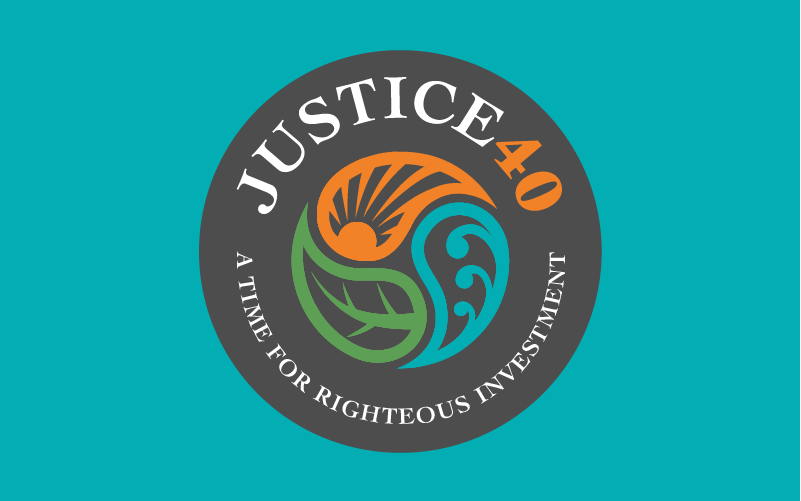
Mar 16, 2023 | Justice40 News, Press Releases, The Latest News
FOR IMMEDIATE RELEASE: February 16, 2023
HOUSTON, TX – Dr. Robert D. Bullard of the Bullard Center for Environmental and Climate Justice at Texas Southern University and Dr. Beverly Wright of the Deep South Center for Environmental Justice are continuing their collaboration for the just implementation of President Biden’s Justice40 Initiative with the launch of the HBCU Climate and Environmental Justice Screening Tool (HCEJST).
The Bullard Center convened a team of data and GIS experts from HBCUs led by Dr. David Padgett, to develop the HCEJST to supplement the government screening tool that excludes race. The experts are part of the Bullard Center, Deep South Center and HBCU Consortium Technical Support Team (TST). This team will be conducting training on the government CEJST and the HCEJST with 21 Justice40 hubs from 10 states to help them better understand how environmental data is collected.
On Tuesday, March 21, 2023, Drs. Bullard, Wright and Padgett will be available to speak with the press about the launch of the HCEJST tool prior to presenting it to J40 Hubs. Media is invited to see the tool in action to get a better understanding of its purpose.
WHO: Dr. Robert D. Bullard of the Bullard Center for Environmental and Climate Justice at Texas Southern University and Dr. Beverly Wright of the Deep South Center for Environmental Justice
WHAT: Justice40 Initiative HCEJST Tool Launch
WHEN: Tuesday, March 21, 2023, 11:00 AM CT/ 12:00 PM ET
WHERE: The Sterling Student Life Center, President’s Lounge, 4th Floor
Texas Southern University
3100 Cleburne Street, Houston, TX 77004
Media Coverage: Media planning to attend in person are encouraged to RSVP by 12 P.M. on Monday, March 20, 2023. RSVP to briana.augustus@tsu.edu or (225) 588-5986.
About the Bullard Center for Environmental and Climate Justice
The Robert D. Bullard Center for Environmental and Climate Justice at Texas Southern University was launched in 2021 to address long standing issues of systemic inequality and structural racism that cause disproportionate pain, suffering and death in Black and other people of color communities. The Bullard Center works to promote environmental, climate, economic, energy, transportation, food and water and health justice. Texas Southern University is a student-centered comprehensive doctoral university committed to ensuring equality, offering innovative programs that are responsive to its urban setting, and transforming diverse students into lifelong learners, engaged citizens, and creative leaders in their local, national, and global communities.
About the Deep South Center for Environmental Justice
Families in the Gulf Coast deserve to live in communities that are free from deadly air and are more resilient to climate change and extreme weather. The Deep South Center for Environmental Justice (DSCEJ) works to empower and engage communities to put environmental justice and equity at the center of all climate action. Led by environmental justice scholar and advocate, author, civic leader and professor of Sociology Dr. Beverly L. Wright, the DSCEJ uses research, education, and community and student engagement to advocate for policy change, lead health and safety training for environmental careers, develop social and emotional community wellness programs, and create new and environmentally healthy opportunities for the residents of communities disproportionately impacted by historic environmental injustice.
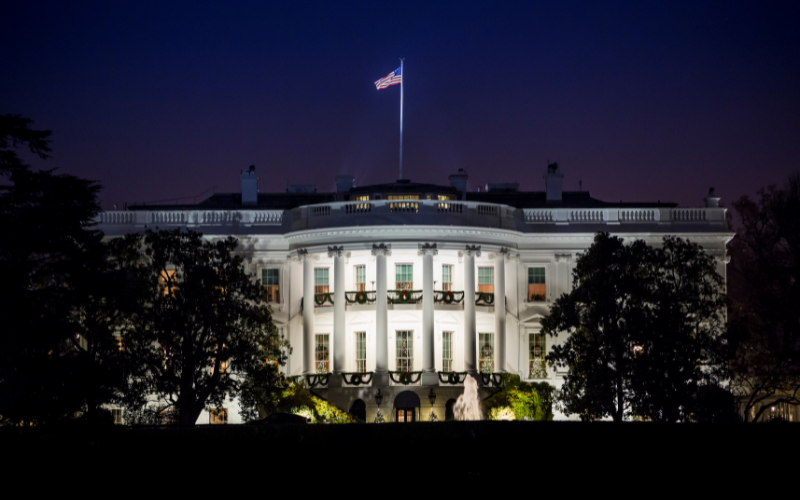
Mar 15, 2023 | Press Releases, The Latest News
New Orleans, LA — In response to President Biden’s budget proposal, Dr. Beverly Wright, Executive Director of the Deep South Center for Environmental Justice, released the following statement:
“All communities deserve to live and thrive in an environment free from deadly air and resilient to climate change and extreme weather. For too long, generations of Black and Brown communities have been forced to live next door to deadly chemical plants, breathe polluted air, and drink unhealthy water. The President’s budget is serious about tackling these issues and aligning policies across the federal government to create new and environmentally healthy ones to improve the lives of communities disproportionately impacted by historic environmental injustice.
“The proposed budget makes significant investments in workforce development and reducing global warming by cutting greenhouse gas emissions by 50 percent by 2030. Funding these priorities will not only reverse decades of harmful environmental policies, but strengthen communities, making them healthier and safer with good job opportunities for generations to come.
“We are especially pleased to see continued funding for Justice40 priorities, which will give us additional opportunities to engage, enlighten and empower communities directly affected by deadly pollution and severe weather events and continue fighting for formative change. This additional funding will strengthen our efforts to link the most overburdened communities to resources that exist for years to come.
“Today the President reiterated his administration’s commitment to environmentally just policies and we look forward to working with Congress and the administration to turn this funding request into a funding reality.”
###
About the Deep South Center for Environmental Justice
Families in the Gulf Coast deserve to live in communities that are free from deadly air and are more resilient to climate change and extreme weather. The Deep South Center for Environmental Justice (DSCEJ) works to empower and engage communities to put environmental justice and equity at the center of all climate action. Led by environmental justice scholar and advocate, author, civic leader and professor of Sociology Dr. Beverly L. Wright, the DSCEJ uses research, education, and community and student engagement to advocate for policy change, lead health and safety training for environmental careers, develop social and emotional community wellness programs, and create new and environmentally healthy opportunities for the residents of communities disproportionately impacted by historic environmental injustice.
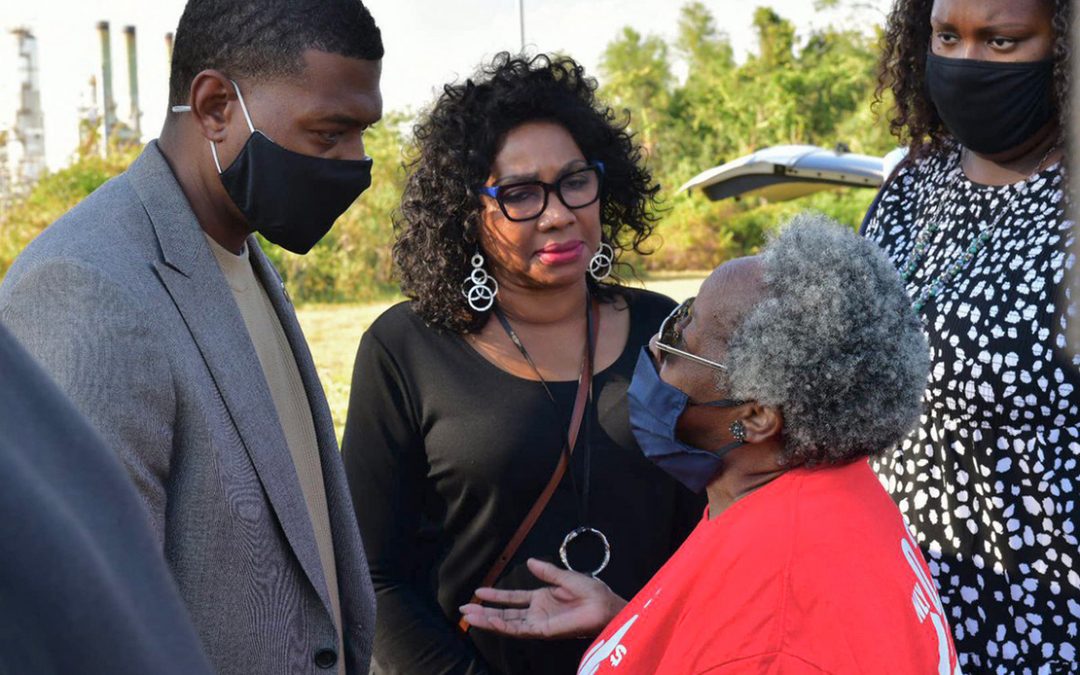
Mar 1, 2023 | Press Releases, The Latest News
Statement from the Deep South Center for Environmental Justice on DOJ’s Filing Against Cancer Alley Chemical Plant
FOR IMMEDIATE RELEASE: March 1, 2023
Contact:
Ginger LeBlanc | gingerl@dscej.org
Valerie Keys | vkeys@skdknick.com
NEW ORLEANS, LA – New Orleans, LA — In response to the Department of Justice’s recent filing against Denka Performance Elastomer, Dr. Beverly Wright, Executive Director of the Deep South Center for Environmental Justice, released the following statement:
“When EPA Administrator Michael Regan visited Cancer Alley more than a year ago, he had the opportunity to see firsthand the disproportionate impact these chemical plants have on the majority Black communities in the Mississippi River Chemical Corridor. He made a commitment to hold these industrial polluters accountable and today the U.S. Environmental Protection Agency and the U.S. Department of Justice delivered. For decades Black families have been human experiments for the petrochemical industry in Louisiana, forcing people to choose between leaving a community their family has been a part of for generations or risk illness or even death.
While this has certainly been no secret, as we have been fighting alongside community activists for decades, this filing is a major step in helping to correct years of inaction. We look forward to continuing to work with the EPA to ensure that all communities can live and thrive in an environment free of deadly pollution.”
###
About the Deep South Center for Environmental Justice
Families in the Gulf Coast deserve to live in communities that are free from deadly air and are more resilient to climate change and extreme weather. The Deep South Center for Environmental Justice (DSCEJ) works to empower and engage communities to put environmental justice and equity at the center of all climate action. Led by environmental justice scholar and advocate, author, civic leader and professor of Sociology Dr. Beverly L. Wright, the DSCEJ uses research, education, and community and student engagement to advocate for policy change, lead health and safety training for environmental careers, develop social and emotional community wellness programs, and create new and environmentally healthy opportunities for the residents of communities disproportionately impacted by historic environmental injustice.

Feb 16, 2023 | Justice40 News, Press Releases, The Latest News
Justice40 Initiative Gaining Momentum as 21 Environmental Justice Hub Leaders from 10 States Convene for Training Institute
Dr. Beverly Wright of the Deep South Center for Environmental Justice and Dr. Robert D. Bullard of the Bullard Center for Environmental and Climate Justice at Texas Southern University Continue Collaboration to Implement the Justice40 Initiative
FOR IMMEDIATE RELEASE: February 16, 2023
Contact:
Ginger LeBlanc | gingerl@dscej.org
Briana Augustus | briana.augustus@tsu.edu
NEW ORLEANS, LA – In the coming weeks, Louisiana and Texas are where environmental justice communities will converge to participate in education and research skills training provided by the Deep South Center for Environmental Justice (DSCEJ), led by Dr. Beverly Wright and the Bullard Center for Environmental and Climate Justice at Texas Southern University, led by Dr. Robert D. Bullard.
Recently, DSCEJ and the Bullard Center organized 21 Regional Hubs in 10 U.S. states that will be managed by leaders of community-based organizations. Both organizations will continue their collaborative work on the equitable implementation of Justice40 as they convene leaders of the Justice40 Regional Hubs in New Orleans and Houston for education and research skills training.
The first 2-day Communiversity training for Regional Hub Leaders will take place February 22 – 24, 2023 in New Orleans, Louisiana at the NOPSI Hotel. The convening will help bolster the capacity of community-based organizations to secure funding for environmental justice projects in their communities. The Communiversity model can help to create a collaborative learning environment that brings together academic researchers, community-based organizations, and residents to address environmental issues in a holistic and equitable way,
“The goal of this training is to empower our hub leaders to pursue and advocate for federal dollars that can improve environmental conditions and address climate risks in their communities. For over 30 years, we’ve witnessed projects and funding intended to benefit our communities never reach them. Our Justice40 work has been designed with that history in mind so that our community-based organizations can advocate with authority, equipped with the tools necessary to successfully secure Justice40-mandated funding and resources that will have a lasting impact on their communities.” said Dr. Beverly Wright, Founder & Executive Director of the Deep South Center for Environmental Justice.
On March 20-22 on the campus of Texas Southern University in Houston, Texas, leaders will be the first to test the new HBCU Climate and Environmental Justice Screening Tool (HCEJST) that was created to show the disparities in neighborhoods after the Climate & Economic Justice Screening Tool (CEJST) created by the federal government left out race. Leaders will learn how to use the tool and will be responsible for teaching other organizations in their respective communities how to use the tool as well.
The Justice40 Initiative, announced 2 years ago, is a part of President Biden’s Executive Order, Tackling the Climate Crisis at Home and Abroad, creating a government-wide initiative with the goal of delivering 40 percent of the overall benefits of relevant federal investments to disadvantaged communities and tracks performance toward that goal through the establishment of an Environmental Justice Scorecard.
“To reverse years of environmental racism in our communities, we must make sure that those hit hardest by environmental and economic neglect worsened by the climate crisis have the resources and infrastructure investments necessary to address years of pollution and sickness for its residents,” said Dr. Robert Bullard, founding director of the Bullard Center for Environmental and Climate Justice. “Our supplemental screening tools will address systemic environmental racism head on and ensure communities of color are not left out once again. By working together, we can empower communities to hold government officials and policy makers accountable to the people they serve.”
The growing list of Justice40 Hub Leaders are:
- Susanna Almanza of People Organized in Defense of Earth and Her Resources (PODER) in Austin, TX;
- Rev. Calvin Avant of Unity in the Family Ministry (UFM) in Pensacola, FL;
- William Barber, III of Rural Beacon Initiative, LLC of Durham, North Carolina;
- Rev. James Caldwell of Coalition of Community Organizations (COCO) in Houston, TX;
- Katherine Egland of Education, Economics, Environmental, Climate and Health Organization (EEECHO) in Gulfport, MS;
- Rashida Ferdinand of Sankofa in New Orleans, LA;
- Dawn Hebert of the East New Orleans Neighborhood Advisory Commission in New Orleans, LA;
- Dr. Nataki Jelks of West Atlanta Watershed Association (WAWA) in Atlanta, GA;
- Darren Leach of Genesis Church in Columbus, MS;
- Paulina Lopez of Duwamish River Community Coalition (DRCC) in Seattle, WA;
- Carolyn Moseley of Eastwick United CDC in Philadelphia, PA;
- Bridgette Murray of Achieving Community Tasks Successfully (ACTS) in Houston, TX;
- Għanja O’Flaherty of North Carolina Environmental Justice Network in Rocky Mount, NC;
- Juan Parras of Texas Environmental Justice Advocacy Services (TEJAS) in Houston, TX;
- Robert Taylor of Concerned Citizens of St. John (CCSJ) in St. John the Baptist Parish, LA;
- Angel Torres of Organization for Human Rights and Democracy (OHRD) in Atlanta, GA;
- Darilyn Turner of Zion Travelers’ Cooperative Center in New Orleans, LA;
- Debra Walker of Sunnyside Community Redevelopment Organization (SCRO) in Houston, TX;
- Donele Wilkins of Detroit Green Door Initiative in Detroit, MI;
- Huey Wilson of Northeast Houston Redevelopment Council (NEHRC) in Houston, Texas; and
- Joe Womack of Clean, Healthy, Educated, Safe & Sustainable Community (CHESS) in Mobile, AL.
About the Deep South Center for Environmental Justice
Families in the Gulf Coast deserve to live in communities that are free from deadly air and are more resilient to climate change and extreme weather. The Deep South Center for Environmental Justice (DSCEJ) works to empower and engage communities to put environmental justice and equity at the center of all climate action. Led by environmental justice scholar and advocate, author, civic leader and professor of Sociology Dr. Beverly L. Wright, the DSCEJ uses research, education, and community and student engagement to advocate for policy change, lead health and safety training for environmental careers, develop social and emotional community wellness programs, and create new and environmentally healthy opportunities for the residents of communities disproportionately impacted by historic environmental injustice.
About the Bullard Center for Environmental and Climate Justice
The Robert D. Bullard Center for Environmental and Climate Justice at Texas Southern University was launched to address longstanding issues of systemic inequality and structural racism that cause disproportionate pain, suffering and death in Black and other people of color communities. Texas Southern University is a student-centered comprehensive doctoral university committed to ensuring equality, offering innovative programs that are responsive to its urban setting, and transforming diverse students into lifelong learners, engaged citizens, and creative leaders in their local, national, and global communities.

